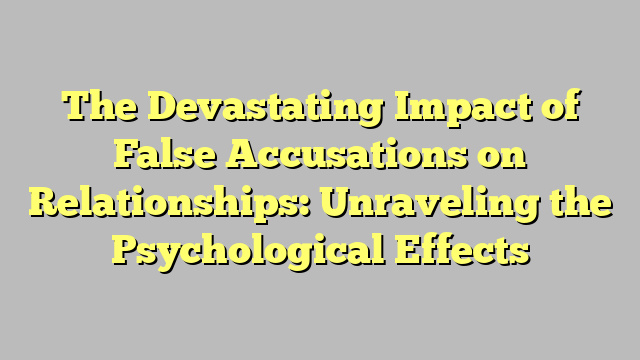The Devastating Impact of False Accusations on Relationships: Unraveling the Psychological Effects
The Devastating Impact of False Accusations on Relationships: Unraveling the Psychological Effects
Introduction
False accusations can have a profound and lasting impact on relationships. When one partner falsely accuses the other of wrongdoing, it can lead to a breakdown in trust, communication, and emotional well-being. This article explores the psychological effects of false accusations on relationships and offers insights into how to navigate this challenging situation.
The Power of Trust
Trust is the foundation of any healthy relationship. When false accusations are made, trust is shattered. The accused partner may feel betrayed and question the authenticity of their relationship. They may wonder why their partner would make such false claims and doubt their own judgment. This erosion of trust can lead to feelings of insecurity, anxiety, and even depression.
Furthermore, false accusations can create a toxic environment where both partners constantly doubt each other’s intentions and actions. This constant suspicion can lead to a breakdown in communication and emotional intimacy, further damaging the relationship.
The Emotional Toll
Being falsely accused can take a significant emotional toll on the accused partner. They may experience a range of emotions, including anger, frustration, sadness, and confusion. These emotions can be overwhelming and may lead to a loss of self-esteem and self-worth.
Additionally, false accusations can trigger feelings of guilt and shame. The accused partner may question their own character and integrity, even if they know the accusations are baseless. This internal struggle can lead to a sense of isolation and a reluctance to seek support from friends and family.
Effects on Mental Health
The psychological effects of false accusations can extend beyond the immediate emotional distress. The constant stress and anxiety associated with being falsely accused can have long-term effects on mental health.
Studies have shown that individuals who have been falsely accused may develop symptoms of post-traumatic stress disorder (PTSD). They may experience intrusive thoughts, nightmares, and flashbacks related to the false accusations. These symptoms can significantly impact their daily functioning and overall well-being.
Furthermore, false accusations can lead to a loss of confidence and a heightened sense of vulnerability. The accused partner may become hypervigilant, constantly on guard for any signs of further accusations. This state of hyperarousal can lead to chronic stress and exhaustion, further exacerbating mental health issues.
Navigating the Challenges
Dealing with false accusations in a relationship is undoubtedly challenging, but there are strategies that can help navigate this difficult situation.
1. Open and Honest Communication
It is crucial for both partners to engage in open and honest communication. The accused partner should express their feelings and concerns, while the accuser should be willing to listen and validate those feelings. Creating a safe space for dialogue can help rebuild trust and understanding.
2. Seek Professional Help
Consider seeking the guidance of a couples therapist or counselor who specializes in relationship issues. A trained professional can provide unbiased support and help both partners navigate the complexities of false accusations. Therapy can also offer tools and techniques to improve communication and rebuild trust.
3. Focus on Self-Care
It is essential for the accused partner to prioritize self-care during this challenging time. Engaging in activities that promote physical and emotional well-being, such as exercise, meditation, and spending time with loved ones, can help alleviate stress and promote healing.
4. Set Boundaries
Establishing clear boundaries is crucial when dealing with false accusations. Both partners should agree on what is acceptable behavior and what is not. Setting boundaries can help create a sense of safety and prevent further harm to the relationship.
The Road to Healing
Rebuilding a relationship after false accusations is a journey that requires patience, understanding, and commitment from both partners. It is essential to acknowledge the pain and trauma caused by the false accusations and work together to rebuild trust and emotional intimacy.
Remember that healing takes time, and it is normal to experience setbacks along the way. However, with open communication, professional support, and a focus on self-care, it is possible to overcome the devastating impact of false accusations and rebuild a stronger, healthier relationship.
Conclusion
False accusations can have a devastating impact on relationships, unraveling the very fabric of trust and emotional well-being. The psychological effects of false accusations can be profound, leading to feelings of insecurity, anxiety, and even depression. However, by engaging in open communication, seeking professional help, focusing on self-care, and setting boundaries, it is possible to navigate the challenges and embark on a journey of healing and rebuilding. Remember, healing takes time, but with commitment and support, it is possible to overcome the devastating impact of false accusations and emerge stronger than ever.

